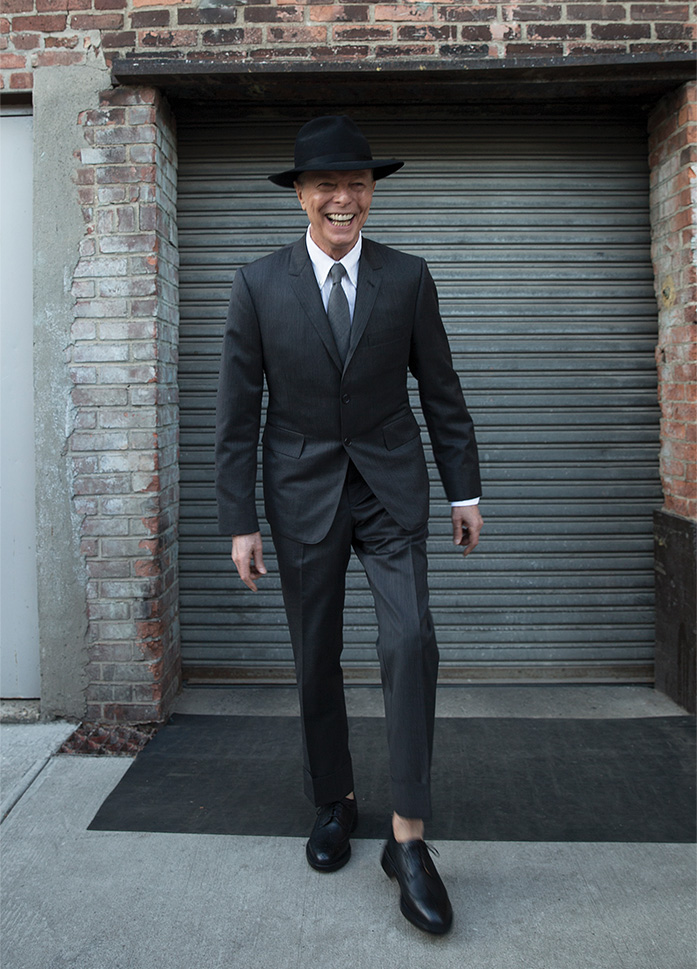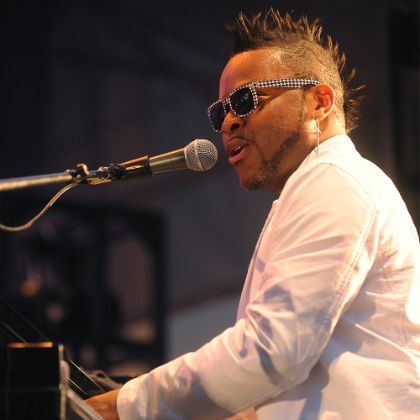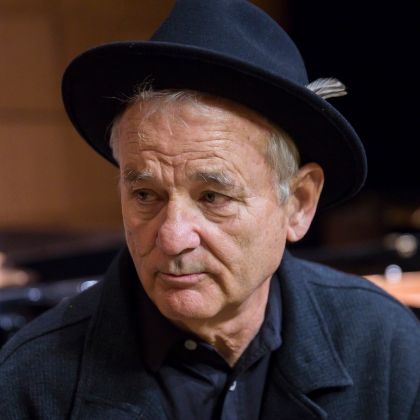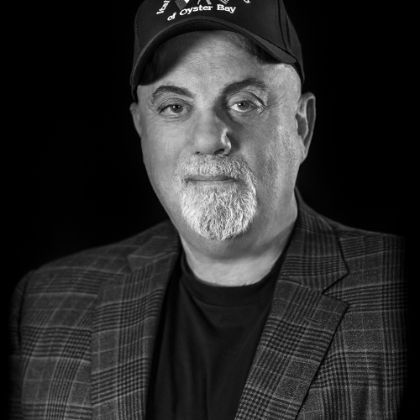Listen Magazine FEATURE
Never Get Old
The Late David Bowie On Positivism, New York As Home, Getting Back On Track, Room For Individuality, The Slog Of Creativity By Committee, Leaving It On The Cutting-room Floor, and Growing Older.
By Wes Orshoski
IN THE DECADE leading up to his death, it was as if David Bowie had vanished. At least that’s how it felt. After being so omnipresent in the MTV Eighties, and continuing to re-invent himself throughout the Nineties via collaborations with Tin Machine, Brian Eno and Trent Reznor, it was business as usual in the early Aughts. That is, until he suffered the onstage heart attack in 2004 that triggered both the end of his touring days and the birth of a new life as a private family man who refused interview and appearance requests and was rarely captured by paparazzi, despite living in one of New York’s busiest neighborhoods.
While Bowie may have vanished, his fans weren’t without hope. And he no doubt delighted in springing his final two albums on them, sometimes without the slightest leak of details, let alone music. The music came, and his handlers rarely gifted the world with a new Bowie image; only occasionally was he photographed at the fashion industry events he attended as the plus-one of supermodel wife Iman. But there was still hope that even if a world
tour was out of the question, maybe Bowie would take a cue from Eric Clapton and return to the stage by way of a residency, maybe at Madison Square Garden, or the O2 in London. There was still hope — until of course there wasn’t.
But in 2003, Bowie was still very much a public figure. In August of that year, the then-fifty-six-year-old was gearing up for what would be his final world tour. He was eagerly giving interviews about Reality (ISO/Columbia), his latest collaboration with producer and longtime musical ally Tony Visconti. That summer, I was fortunate to share a few minutes with him, talking about both, before he rushed off to rehearsals for a tour kick-off gig that was held, almost improbably, at The Chance, a funky old theater in Poughkeepsie, some eighty-five miles north of Manhattan in upstate New York (not far from where Bowie recorded the album and kept a country retreat).
“I’m very excited about it,” he told me at the time. “It’s our so-called secret gig, about three hundred people, I think. We get to try out most of the new material. So we’ll get some feedback there.”
One wonders if Bowie got any meaningful feedback.
I was at the gig that night, and I remember him standing center stage for most of the show in a T-shirt, which seemed to suit him as little as the beat-up, minor-market venue. It was an overwhelming experience to witness him in such an intimate setting. With the music loud and the stage just steps from the entrance, I hadn’t really adjusted to the incongruity of it all before the show had already come and gone. I’m not sure how objective the vibe was, and whether Bowie got a read on what people thought of his new songs — they were too busy freaking out that he was basically in their lap, even while he ignored most of his greatest hits.
Within the next two months, Bowie would release the album and set out on that last tour. Below is the entire conversation with him from that summer, heretofore unpublished, captured before he vanished from the world stage and slipped into that private life.
With its reference to Battery Park, I’m assuming ‘New Killer Star,’ the first song on Reality, was inspired by 9/11.
Absolutely. It’s an impressionistic piece, I guess, revolving around the idea of actually living in the town where all that took place. And out of it, I’m trying to pull something that has the feeling of positivism about it. The positivism that I’m feeling for this album, for the way that I’ve written it, comes from having this entire family unit — and having a three-year-old daughter. It really is important that I should try and embrace as much positivism in the future as possible. There is no point in me wallowing in some kind of negativity about the future because I have to think for my daughter as well as myself.
How long have you lived in New York, and is it still a source of inspiration?
Well, yes. Off and on, this last bout we’ve been here about ten years, something like that. Ironically, I counted up that I’ve actually lived in New York longer than any other city in the world, including my hometown, London, which is extraordinary. Over the years, I’d spend a year here, or eighteen months here, but this last decade, it’s just been extraordinary, and it really has become home for me. When I was a teenager, it was the place that represented everybody from Dylan to Allen Ginsberg, the Beat scene and the coffee bar scene, early rock music. This was the Mecca for what I wanted to do, really, especially downtown and the Village and all that. It was kind of like it was a dream to go to New York one day. And I guess the second part of that dream is that one day I would have an apartment in Manhattan [laughs]. And I’ve had many apartments here now.
I’m still working on that — I live in Brooklyn.
Ha! Well, that’s kind of groovy, too. That’s where Tony Visconti comes from.
Speaking of Tony, it really seems as though since the Heathen album that you two are in another groove. Is it something you see continuing over the next few years?
Yes, it is. We weren’t even tentative when we went in to do Heathen [ISO/Columbia]. We kind of knew that we would produce something really excellent. We didn’t know quite what it was going to be, but it just kind of fired our motors, I think. And we charged into Reality absolutely gung-ho about doing what we used to do, which is produce a signature sound and an interesting construct that would sound quite not like anybody else’s work. It would be identifiably kind of a Bowie/Visconti production, and it would just have that special thing that we have when we work together. I can’t really articulate it, but when we work together, we do seem to produce really good quality stuff that has a sense of integrity, and is interesting. It’s just right, and it’s very exciting. We’re already half-talking about the next album. And I’ve got to get this tour done. We leave an album always thinking, ‘This is a good piece of work,’ and we judge it very much on the last day of when we’re listening to our final mixes. And at that point, it’s critical for us to look at each other and say, ‘This is a real success.’ Frankly, it doesn’t really matter what happens after that, because, you know, things like Low and ‘Heroes’ and all those things, they weren’t huge sellers. I mean [laughs], they were just not huge sellers, but we knew how important and good they were when we were listening to the final mixes, and we still judge things in that way. As long as we can say ‘That was a first-class piece of work,’ everything after that is frankly a bonus.
‘If it doesn't work in the first take, [I tend to] abandon the song.’
There almost seems to be a newfound enthusiasm for the work. Anything in particular trigger that?
Well, ever since I pulled together the present band that I’m working with live [which featured bassist Gail Ann Dorsey, drummer Sterling Campbell, guitarist Earl Slick and longtime pianist/keyboardist Mike Garson], that’s kind of coincided with the enthusiasm, I guess, for working in the studio and onstage. It’s been about eight years now, ever since about ’95 to ’96 — that’s when I really felt as though things were absolutely on track again for me.
Did your move from Virgin to Columbia Records contribute in any way?
If anything, that kind of solidified the general sort of buoyancy that I’ve felt over the last few years. It seems a very good situation with Columbia, with my label, ISO. They give me a lot of leeway, let me record things when I want to record them. And, more importantly, they let me release them when I’m done with them. I don’t have to put things into cold storage for eighteen months or so, which is the most frustrating thing, I think, that can happen to a writer, especially a prolific writer. I do write a lot, and after a while, I do lose interest and enthusiasm for those tracks, because I’ve moved on to writing new tracks. So if I’m sitting on stuff, I haven’t got much patience.... With Virgin, it was a question of having to kind of just sit there and wait until it was okay to release another album. That was my experience with most companies [laughs]. It’s been pretty much like that. I suppose the nature of the business has changed so fundamentally that all the majors now have these long sell-by dates. Sell-off dates, rather. Sell-by dates, in some cases [laughs]. But they definitely have a sell-off date, and it’s a minimum of eighteen months, and sometimes it stretches to two years or more. And then you have to find out where you are in their schedule of releases and all that. Those schedules can really go on into the future.
It seems strange that an artist of your stature couldn’t demand more accommodating releases practices.
Well, it’s by committee. The decisions are made at these corporations by committee, generally. And that’s their pattern of release. There’s no room for individual, idiosyncratic kind of artists so much in what goes on these days.
It was so much easier, I think, in the old days, because it wasn’t really an industry. I mean, it had all the hardware of the industry, but it still had an awful lot of enthusiastic amateurs running it [cackles]. You know, the idea of, ‘Yeah, let’s put that out, that’s cool’ [laughs]. There was no guy saying, ‘Well, marketing and focus groups’ — there was none of that. There was just: ‘Do it.’
Tell me a little bit about your songwriting process these days. Does everything start at home?
Yeah, I have some real dumb stuff. I’m not high tech to any sense of the imagination, but occasionally I’ll take things a little further at home. I have a four-track or something, a Roland VS 1680, and I’ll do sort of a small multi-track, but most of the time, I just jot down on DAT and on paper exactly the chord sequence that I’m working with, and I’ll put a voice over the top. I’m so scared of losing that original quality. I mean, I guess I demoed Reality up in the studio with Tony. I did so much of it myself, with Tony just taking everything down as I played it. But what you have there, a lot of the time, is kind of the feel of the original demos, because a lot of it we didn’t replace. It’s sort of the keyboards and then Tony would add bass to it, and Sterling [Campbell] would come in and play drums with a couple of the guitar players and all that. And I left my own guitars on most of the tracks. So most of the rhythm tracks, I’m plunking away in there. So it has a quasi-demo feel to a lot of the tracks, which is really good — a demo energy to the tracks.
It’s got a live energy.
Exactly. It’s the original idea. It’s not the second reading of an idea. We tend to really work in first-take situations. If something isn’t working... I kind of learned that from reading what Dylan said in some interview many years ago. He said that if it doesn’t work in the first take, he abandons the song. And, for me, I also tend to do that. I’m not good at working at something to make it feel right. There’s only one song on the album I’ve done that with. And that was this thing called ‘Bring Me the Disco King.’
I’m assuming then that you've left a huge number of songs on the cutting room floor.
Oh, yeah! I have so many.
How many? Could you put a number on that?
[Long breath.] No, I’m not putting a number on it, because all the kids on my fan site will be demanding that I release them all. So many times I have to tell them, ‘You know, there’s a reason I’ve not released them:’ — [laughs] — ‘I don’t like the way they sound.’ [Laughs]. You know, it’s like, ‘Hey, Bowie, you’ve got all these rare tracks, just put ’em out, will ya?’ And it’s like, ‘There’s a reason they are rare!’ [Laughs]. Sometimes they really should stay that way. But, yeah, there are a number of songs.
‘The decisions are made at these corporations by committee, generally. And that’s their pattern of release. There’s no room for individual, idiosyncratic kind of artists so much in what goes on these days.’
Reality ends with the beautiful, nearly eight-minute ‘Bring Me the Disco King.’ It’s no surprise that it’s a bit more labored over than the others. It sounds like it.
No song has undergone what this one has. I mean, I wrote it in ’92, around the time of my marriage. And it was kind of a... I guess it was a cynical bye-bye to the past kind of thing, and I had it as a real uptempo swipe at disco. I mean, it had audio mirror balls [laughs]. It really, really felt like a disco piece. I mean, it had synth drums on it, and it really was a belter. Although it’s kind of supposed to be kind of cheese, it really sounded cheese. So, I kind of just left it there. In the mid-nineties, I tried it again with [guitarist] Reeves Gabrels, and we tried a different kind of approach to it. But it was, again, fairly high energy. And that didn’t work either, so I just abandoned the thing. And then this time — one last time — I thought I’d have a crack at it. I thought, let’s start by stripping it right back to the essential song. And when we did that and slowed the tempo way down, I suddenly realized it needed nothing more. It didn’t need an arrangement. It just needed [pianist] Mike Garson’s interpretation against my vocal. And that was it. Then it really made sense, and didn’t sound like a cynical piece anymore. It felt like a fairly heartfelt piece.
In this new digital age, touring seems as though it will be more and more important to all artists. Is it still enjoyable to you, four decades later?
One, I’m enjoying it, yes. And that’s the priority to me. And, two, it’s wonderful to keep expanding the audiences. I’ve been extremely lucky having a lot of fairly young fans within the industry that I’m in. Having Trent [Reznor of Nine Inch Nails], Placebo, the Smashing Pumpkins, and all those guys kind of talking about my work — in reference to what they’ve done and all that — has been just wonderful in terms of the kinds of audiences I’ve been attracting
for the last eight years or so. It’s kept a lot of young kids coming in to see what we do, and that’s been fantastic.
‘You think, ‘Oh, I won’t survive above thirty.’ [Laughs.] And of course the horror when you do. [Loud laughter.]’
It’s ironic then that you have a song on the new album called ‘Never Get Old.’ It’s something you sort of never seem to do.
[Laughs.] Well, I just feel as contented as one can feel in these particular times. I think that’s the best way of saying it. My marital life, domestic life, personal life, whatever you want to call it is just wonderful, and my work has been going so well. So I’m a really lucky guy, you know, in that way. When I was in my twenties, I’d never thought for one second that my life would be this good in fact. This age didn’t exist for me when I was twenty. ‘Fifty-six? Are you kidding me? I’m never going to make it there.’ You know, all these romantic, nihilistic dreams that teenagers have. You think, ‘Oh, I won’t survive above thirty.’ [Laughs.] And of course the horror when you do. [Loud laughter.]

This article originally appeared on listenmusicculture.com, Steinway & Sons’ multi- award-winning magazine
related...
-

Soundboard — Davell Crawford
Davell Crawford discusses the rich jazz tradition of New Orleans, the fall of New York, moving forward, and employing the multiple personalities that live within you.
Read More -

Soundboard — Bill Murray
Bill Murray discusses American Letters, Mark Twain, James Thurber, absurdity vs. ridiculousness, failure, getting to work, writing vs. acting, rhythm and flow, and improvisation.
Read More
-

Same Hits, Different Day
Living legend Billy Joel talks about the staying power of his music, the alchemy and process of songwriting, the origins of his aesthetic, Beethoven and the Beatles, and what he’s trying to learn now.
By Ben Finane
Read More